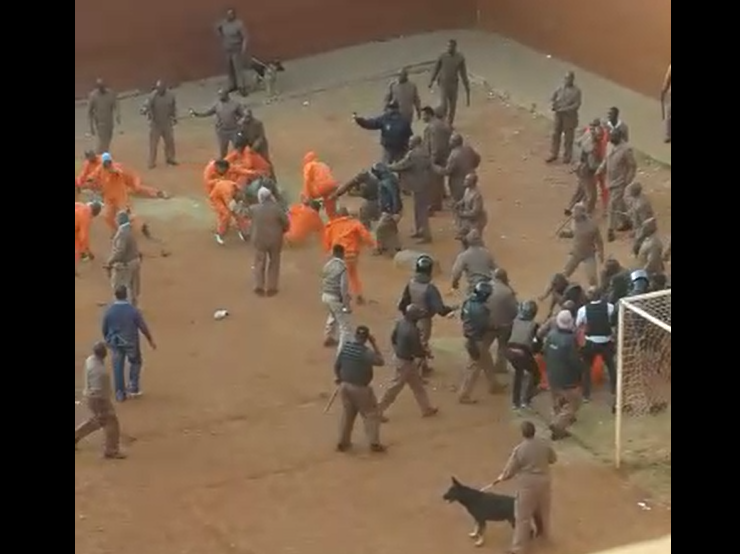Isolated prisoners file court application
Inmates at Kgosi Mampuru II want to be moved back to their cells
A group of inmates who have been isolated in basement cells after a riot at Kgosi Mampuru II prison are attempting to take the Minister of Correctional Services to court. They want to be returned to their normal cells.
Martin Motsoeneng, one of the thirteen inmates – many of whom are serving life imprisonment – will represent them in the Pretoria High Court.
The standard cells are communal, while the basement cells take one prisoner each, and lack amenities. “It’s a place for people for those who are punished,” according to a prisoner.
The inmates filed the application on their own, without the help of their lawyer Clare Ballard from Lawyers for Human Rights (LHR). They are currently awaiting a date for the hearing of their application.
Meanwhile, Ballard is attempting to secure an intervention for nine of the inmates through Judge Johann van der Westhuizen, the Inspecting Judge for Correctional Facilities.
In a letter to van der Westhuizen on 4 July requesting that he review the isolation, Ballard wrote that when she called the Area Commissioner she was told that the inmates “had been moved to another part of the prison on account of them being trouble makers and would be charged accordingly”.
Ballard told GroundUp that the judge responded saying that he doesn’t believe that they are being kept in “isolated segregation” and are merely being “separated”.
Ballard disagrees, and says where the inmates are being kept is “for all purposes, segregation”.
LHR is going to take the judge’s decision on review.
In their court papers, the inmates state that they want the court to order the minister and the Area Commissioner to release them back to their respective units at Kgosi Mampuru II “with immediate effect” and to declare that the “segregation” was unlawful.
The inmates also want the court to interdict the minister and the area commissioner from transferring them to other correctional centres without their written consent. They also want an order stopping further punishment. They want the South African Police Service to be summoned in order to lay assault charges against members of Correctional Services.
They also want the court to order the minister to address all prisoners sentenced to life (lifers) at Kgosi Mampuru Prison and to issue a statement addressing parole issues, the underlying cause of the protest that led to them being isolated.
Parole issues
In court papers, inmate Motsoeneng says that due to the “laziness and inefficiency” of some members of Correctional Services in considering inmates for parole, lifers “voiced their unhappiness”.
Lifers say their prisoner profiles sent to the Minister for parole consideration are incomplete, leading to parole being denied.
Motsoeneng said the Area Commissioner came to Pretoria Central about a year ago and “made a number of promises that were not fulfilled to date”.
“The lifers then decided to write and submit a memorandum of grievances to the office of the National Commissioner in an attempt to have him intervene and bring about a solution to their grievances.”
Motsoeneng said that upon further engagement with the Area Commissioner, a committee was selected who would represent all the lifers and meet with management.
“After the lifers realised that the Area Commissioner was failing them then they embarked on a hunger strike and a sit-in demanding that there be a solution to their grievances,” states Motsoeneng.
They then submitted another memorandum to the minister and gave him 14 days to respond.
On 2 July “the lifers decided to peacefully assemble at the courtyard and asked the management to give feedback on the response by the Minister”. This was when a riot broke out. Motsoeneng said that the following day most of the members of the committee elected to represent the lifers were “were forcefully removed from their cells and then assaulted” and moved to isolation.
He also mentioned that some of the offenders who were segregated were studying and this was a violation of their rights to continue studying.
GroundUp contacted the Department when the inmates were originally segregated on 3 July. Spokesperson Logan Maistry said departmental policies “do not permit detailed responses to inquiries on security operations and related issues, as well as individual/identified offenders”.
Maistry said that the day after the riot “certain offenders refused to open their cell, blocking the cell door with lockers, and threw boiling water at officials”.
He confirmed that “in line with relevant policies and procedures, certain inmates have been accordingly transferred”. He also said that “with regards to isolation, there are processes that DCS must adhere to including reporting the matter to the Inspecting Judge”.
Parallel to the efforts by LHR and the inmates own efforts, there are various disciplinary charges that are being implemented. However, the inmates’ hearings have been postponed as Ballard said that there were no incident reports that she could read and that she didn’t know what the charges were.
The hearing is now set for 21 August so that LHR can be provided with the relevant documentation. Until then, it appears that the inmates will stay in isolation.
Support independent journalism
Donate using Payfast

Don't miss out on the latest news
We respect your privacy, and promise we won't spam you.
Next: Asylum seekers will have to live near borders if Home Affairs has its way
Previous: Steenvilla social housing residents protest evictions
© 2017 GroundUp. 
This article is licensed under a Creative Commons Attribution-NoDerivatives 4.0 International License.
You may republish this article, so long as you credit the authors and GroundUp, and do not change the text. Please include a link back to the original article.

